Marilyn Hamilton's Blog, page 5
December 18, 2024
Local Place Plan Ecovillage Findhorn: Trailer for Community Conversation
Local Place Plan: Contexts for Consent
This Infographic Trailer was prepared to update and inform the Ecovillage Findhorn Community prior to and during a community meeting, November 25, 2024.
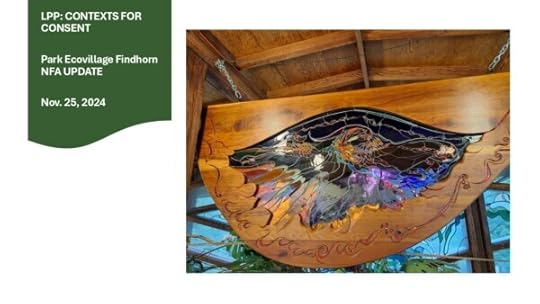
December 16, 2024
Integral City Ecosystem of the Year 2024: Neighbourocracy, Children’s Parliaments, SONEC
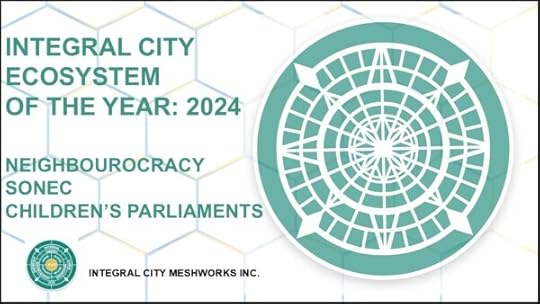 Let’s consider the “organs” in this ecosystem (and notice the Integral City Intelligences linked in italics).
Neighbourhood Parliaments
Let’s consider the “organs” in this ecosystem (and notice the Integral City Intelligences linked in italics).
Neighbourhood Parliaments
Joseph Rathinam (a Living Cities Earth Co-Founder) has helped inspire grassroots neighbourhood democracy across Southern India.
Joseph Rathinam has been training people to set up and operate Neighbourhood Parliaments for almost thirty years, and has been the elected leader of his own neighbourhood in Chennai (a city in Tamil Nadu, southern India) for about twenty. He has helped people to set up tens of thousands of hyperlocal democratic mutual aid institutions across India and around the world (as reported by Citizen Network).
Most recently, city officials in Augsburg, Germany, have decided to adopt a European version of the Neighbourhood Parliament model in the wake of his visit to Augsburg in August of 2022. They want the high-engagement, low-cost benefits of neighbours helping neighbours that this model promises.
The model of neighborocracy has these Integral City Intelligence features:
Street-level– The basic unit is street-level government – no more than about 60 people or 30 UK householdsInclusive– It is essential that everyone is included and everyone has a vote and all decisions are by consensus (although you can vote ‘I can live with that’)Strategic: Inquiry & Meshworking & Navigating
Empowering– Everyone takes on a leadership role – minister of finance, energy etc. – roles and strategies are agreed togetherSubsidiarity– What can be done at the street level is done at the street level – the indirect goal is to invest in each other – not in corporationsFederative– Streets federate to neighbourhoods – neighbourhoods federate to municipalities – municipalities federate to regions – goal is global democracyContexting: Living
Intergenerational– There are 3 interlinked kinds of Parliament organised by age: Children/Young People/AdultsStrategic: Navigating
Convergence– Don’t threaten the existing system of power – run parallel- create positive pathways with old system .Joseph’s work reflects Emergent Intelligence and builds on the work of Father Edwin Maria John who started to develop Basic Communities in the 1980s, and which it was itself inspired by the Liberation Theology movement from Latin America. It links to the emerging practice of sociocracy and the emerging movements of New Municipalise, or what Citizen Network calls Neighbourhood Democracy.
You can listen to Josephy talk on the Scottish Communities Climate Action Network podcast here.
 Children’s Parliament
Children’s ParliamentChildren’s Parliaments were started by Joseph in India.
Children in India have taken their lives into their own hands. Strategic: Inquiry & Meshworking & Navigating
They don’t want to tolerate social grievances as well as environmental pollution any longer. They have been founding children parliaments and electing their own ministers in order to stand up for their rights. They are not only changing their own lives for the better, but also those of their communities.
This exemplar and learning are now being brought to Europe by Lisa Praeg. Lisa Praeg (from Vorarlberg, AT) and Anna Kersting (from Berlin, régisseur “Power to the Children” ) are bringing global leaders in the Children and Youth Parliaments movement to Berlin.
A collection of films provide inspiring stories and examples shared by Joseph. One film focuses on the value of Children Parliaments and the emergence of new kinds of schools using sociocratic methods.
This film also focuses on the organisation of Children Parliaments:
This film was produced together with Nathaniel Whitestone, Indra Adnan, Swarnalakshmi Ravi and Joseph Rathinam and explores the reasons why neighborocracy is powerful and an essential part of the global transition of to a just and sustainable world:
This is a longer interview with Joseph, in conversation with young people, exploring the ideas that have inspired him and the lessons he has learned:
Film | 08.08.23
local government, Neighbourhood Democracy, India, Film
The European initiative has been learning how to bring Power to the Children, demonstrating the Integral City Intelligences of Contexting: Living Intelligence & Strategic: Navigating Intelligence.
The film takes the perspective of the children to tell us about the challenges they have to face in a society that expects them to follow the example of adults. The film shows how these children have opted to take a new path – with determination, courage and creativity.
Three examples of children taking leadership roles in their village are Sri Priya, Shaktivel and Swarna Lakshmi:
Sri Priya (14) – Home Minister (Contexting: Eco Intelligence)
She is taking care of the environmental problems of the village.
She has learned from a young age to stand on her own feet. Her parents live in a faraway city, where they found work. She lives with her grandmother and elder brother. Since she has pointed out the garbage and water problems of the village to the mayor again and again, she has earned great respect from the adults. Together with the children’s parliament she has stopped child marriage in her village.
Shaktivel (15) – Cultural Minister (Collective: Cultural Intelligence)
He loves dance and theatre. As cultural minister he develops unique and vibrant campaigns with his creativity. Many children from the village suffer because of the alcoholism of their fathers. They decide to ensure that the alcohol shops are going to be closed. Together with the children Shaktivel develops a play. They want to show the adults what it means for them to grow up in a family where the father drinks and becomes violent.
Swarna Lakshmi (15) – Prime Minister (Individual Inner/Outer Intelligence)
As a blind girl, she has learned from a young age what it means to be different.
Since she was ten years old she has been fighting for inclusion. After having various minister roles, she now has got the highest position as the prime minister of India within the children parliaments. She is committed to ensure with the whole heart that the child rights are respected, not only in India, but everywhere in the world.
There are two types of Children Parliaments. One is founded by the children; the other is founded by the schools.
The film (produced by Lisa and team) is only about Children Parliaments which are founded by children. They are called Neighbourhood Parliaments in India. (Collective: Social Intelligence)
The idea goes back to the NCN (Neighbourhood Community Network), a South Indian aid organisation that developed the concept of independent children’s parliaments about 15 years ago. The concept has been adopted by many local human rights and environmental organisations in India.
In recent years, more than 100,000 such Children Parliaments have been created there.
Delegates from many countries are now travelling to India to get advice on how to organise children’s parliaments in their countries. The founders of the Indian children parliaments also conduct trainings in Europe.
Local human rights and environmental organizations in India go to the villages to first inform the children about their rights. Most children do not know that there are children’s rights, such as the right to education.
Usually social workers are involved. Sometimes someone from the village is chosen who is willing to support the children. Not all adults agree that children have their own rights. It is important that the children trust this person. The person of trust teaches the children about democracy and explains how a parliament works, and accompanies them over a longer period of time.
As soon as the children can solve their problems on their own, the person of trust withdraws, but is still available to them as a contact person.
What effect do children parliaments have?Child marriage (Individual Outer, Collective Cultural)
A large proportion of young girls are still being married off in the rural areas of India.
Even in the villages that are shown in the film, girls were being married off every year, sometimes as young as 12 years old. The children of both parliaments are proud that they have managed to abolish child marriage completely in their villages. If they find out that a young girl is going to get married, they immediately contact the parents of the girl and explain to them that child marriage is forbidden by law and that girls have a right to education. If the parents do not agree, the children contact CHILD LINE, a governmental organisation that advocates for child rights.
Child labour (Individual Outer, Collective Cultural, Social)
The children from both villages in the film have also managed to stop child labour and make sure that all children go to school. If a child does not turn up at school, they ask for an explanation from the parents of the child. In the case of parents forcing their child to work, the children inform them of child rights. If the parents insist that their child works, the Children Parliaments contact CHILD LINE.
Domestic violence and alcoholism (Individual Outer, Collective Cultural, Social)
Obedience to parents is given the highest importance in India. If one parent is violent or dependent on alcohol, the children become conflicted. They know they have to follow their parents, but if the father beats them and their mother because of his addiction to alcohol, there will be no protection anymore. They know their rights, but there is no one to protect them. Therefore, they try to help themselves by starting campaigns against alcoholism and violence.
Environmental issues (Ecosphere Intelligence)
There is usually no garbage disposal in the rural areas of India. Villages and whole regions are contaminated with plastic garbage. In addition, people from the villages burn their plastic waste. The children from the Children Parliaments understand the connection between global warming and the burning of garbage. They are starting campaigns in their villages to inform the adults who are very often illiterate.
Democracy, Water – and Electricity supply (Contexting: Integral, Collective: Social)
The children from the Children Parliaments have learned how democracy works. They know that the mayor of the village is supposed to ensure sufficient drinking water and overcome problems with the sewage. They also make sure that defective street lights get repaired.
They write petitions and threaten to contact higher authorities in case the mayor forgets his promises.
The SONEC partnership includes organizations from 7 European countries (Austria, Germany, Greece, Hungary, Italy, The Netherlands, UK), that bring into the project diverse social backgrounds, experiences and knowledge. Local governments, scientific platforms, various educational institutions, existing neighbourhood and citizen participation initiatives with a longer or shorter history are also participating.
Nathanial Whitestone (co-founder of SONEC and co-founder of Living Cities Earth) explains:
This allows for mutually enriching exchanges among partners, as well as indirect benefits for other European stakeholders.
The Indian Neighbourhood Parliaments movement (Strategic: Inquiry & Meshworking & Navigating Intelligences) , while large in European terms, includes only a small fraction of the 1.4 billion residents of India. Similar community networks – the Global Ecovillage Network, (Award Winner of Integral City Network 2023)for example – also cover only a fraction of the communities in areas where they have developed. If this way of organising is really to offer humanity a viable path to resolving the global and local challenges we face in coming decades, it must be available to almost everyone.
The SONEC movement does offer an opportunity for weaving together the wide range of similar projects and networks of communities that are doing similar work. You can think of a SONEC as a specific form of neighbourhood democracy (as promoted and supported by the Neighbourhood Democracy Movement), which is a specific form of Community Agency Network (as promoted and supported by The Alternative UK).
This implies a sort of hierarchy of shared purpose: (Collective Cultural, Social Intelligences)
Groups that are supporting some form of locally-led holistic community development (such as the CTRL Shift alliance)Groups that are supporting Community Agency Networks (such as The Alternative UK and the Asset Based Community Development movement)Groups that are supporting neighbourhood democracy in specific small-scale neighbourhoods (such as the Neighbourhood Democracy Movement)SONEC and Neighbourhood Parliaments networks are examples of neighbourhood democracy, as are Cohousing networks and Ecovillage networks.
In practice the Sociocratic Neighbourhood Circle is a form of resident-led holistic community development, combining ( Contexting, Collective Social, Strategic, Evolutionary Intelligences):
the sort of “connected community” you might find in a great cohousing community or a community agency network of the sort supported by Asset Based Community Development practitioners, withpractices of learning together throughout life in a way that reflects the Bildung movement and the successes of, for example, the Swedish “study circle democracy,”sociocratic governance at the neighbourhood level (and, through sociocratic double-linking and federation, at other levels), andCollective Impact alliance-type networks bringing together multiple organisations and associations at each level of organising.The emphasis on developing this alliance, as an essential part of the model, means that wherever the SONEC network develops we must also nourish and support allied communities and partner organisations that have similar objectives. For example, in the UK we work closely with a range of partner organisations through the CTRL Shift network to provide support to local groups – whether or not they choose to adopt the SONEC model.
Nate Whitestone believes that this active mutual support, together with a heart-centred practice of developing meaningful connections with our neighbours, a commitment to learning, and a well-structured form of local governance, is what we need in order to live well into the turbulence of the 21st century. SONEC hopes that others feel similarly!
===
AWARDIt is an inspiration to learn how Integral City Intelligences have grown across Gaia’s noosphere, starting with impulses of Liberation Theology in Latin America, spreading to India where they seeded Neighborocracy which in turn incubated Children’s Parliaments and are now jumping from India to Europe and creating nurturing hybrids like the Sociocratic Neighbourhood Circles in SONEC.Congratulations to this Amazing Ecosystem of Neighborocracy, Children Parliaments and SONEC. We are proud to recognize you as the Integral City Ecosystem of the Year 2024.===
===
Learn about the prior Integral City of the Year Awards here:Global Ecovillage Network of the Year 2023
Global City Collaboration – City Collaboration of the Year 2022
Urban Arena for Just & Sustainable Cities – City Region of the Year 2021
Edmonton – City of the Year 2020
Amsterdam – City of the Year 2019
6AIKA Finland – Cities of the Year 2018
Russia’s 3 City Associations – City of the Year 2017
Fort McMurray – City of the Year 2016.
Paris – City of the Year 2015 .
===
REFERENCESIf you’d like to know more about the details of the SONEC practice or to get more actively involved you can add your name here.
And you are welcome to contact the SONEC project via our website, visit: https://sonec.org/
Notes:
Journal of Asian Scientific Research, United People Designing a New Model of Governance A Community Agency Network, also known as a Citizen Action Network, can take a wide variety of forms. For more on this concept, view the relevant Appropedia page.The publisher Citizen Network Research publishes the white paper, Neighbourhood Parliaments and Sociocracy © Nathaniel Whitestone 2022.
THE SONEC HANDBOOK (52 pages), THE SONEC HANDBOOK SHORT VERSION (18 pages) and THE SONEC POLICY BRIEF (3 pages) can be downloaded from this Website link (in multiple languages.
OTHER USEFUL LINKS
Neighbourhood Community Networks
Sustainable development goals by the UN
https://sdgs.un.org/
Facebook page of Neighborocracy by Joseph Rathinam
https://www.facebook.com/neighborocracy/
duties. Countless Children Parliaments have solved water and electricity problems this way.
If you are interested to watch the film, or acquire a license, please contact:
Anna Kersting Filmproduktion
Backpack Distribution – Anna Kersting Filmverleih
Bruno Taut Ring 5 b
12359 Berlin
E-Mail childrenparliament.info@gmail.com
If you are interested to contact the founders of the Indian children’s parliaments, please contact:
Joseph Rathinam
Email: rathnamjoseph@gmail.com
Integral City Ecosystem of the Year 2024: Neighbourocracy, Children Parliaments, SONEC
 Let’s consider the “organs” in this ecosystem (and notice the Integral City Intelligences linked in italics).
Neighbourhood Parliaments
Let’s consider the “organs” in this ecosystem (and notice the Integral City Intelligences linked in italics).
Neighbourhood Parliaments
Joseph Rathinam (a Living Cities Earth Co-Founder) has helped inspire grassroots neighbourhood democracy across Southern India.
Joseph Rathinam has been training people to set up and operate Neighbourhood Parliaments for almost thirty years, and has been the elected leader of his own neighbourhood in Chennai (a city in Tamil Nadu, southern India) for about twenty. He has helped people to set up tens of thousands of hyperlocal democratic mutual aid institutions across India and around the world (as reported by Citizen Network).
Most recently, city officials in Augsburg, Germany, have decided to adopt a European version of the Neighbourhood Parliament model in the wake of his visit to Augsburg in August of 2022. They want the high-engagement, low-cost benefits of neighbours helping neighbours that this model promises.
The model of neighborocracy has these Integral City Intelligence features:
Street-level– The basic unit is street-level government – no more than about 60 people or 30 UK householdsInclusive– It is essential that everyone is included and everyone has a vote and all decisions are by consensus (although you can vote ‘I can live with that’)Strategic: Inquiry & Meshworking & Navigating
Empowering– Everyone takes on a leadership role – minister of finance, energy etc. – roles and strategies are agreed togetherSubsidiarity– What can be done at the street level is done at the street level – the indirect goal is to invest in each other – not in corporationsFederative– Streets federate to neighbourhoods – neighbourhoods federate to municipalities – municipalities federate to regions – goal is global democracyContexting: Living
Intergenerational– There are 3 interlinked kinds of Parliament organised by age: Children/Young People/AdultsStrategic: Navigating
Convergence– Don’t threaten the existing system of power – run parallel- create positive pathways with old system .Joseph’s work reflects Emergent Intelligence and builds on the work of Father Edwin Maria John who started to develop Basic Communities in the 1980s, and which it was itself inspired by the Liberation Theology movement from Latin America. It links to the emerging practice of sociocracy and the emerging movements of New Municipalise, or what Citizen Network calls Neighbourhood Democracy.
You can listen to Josephy talk on the Scottish Communities Climate Action Network podcast here.
 Children’s Parliament
Children’s ParliamentChildren’s Parliaments were started by Joseph in India.
Children in India have taken their lives into their own hands. Strategic: Inquiry & Meshworking & Navigating
They don’t want to tolerate social grievances as well as environmental pollution any longer. They have been founding children parliaments and electing their own ministers in order to stand up for their rights. They are not only changing their own lives for the better, but also those of their communities.
This exemplar and learning are now being brought to Europe by Lisa Praeg. Lisa Praeg (from Vorarlberg, AT) and Anna Kersting (from Berlin, régisseur “Power to the Children” ) are bringing global leaders in the Children and Youth Parliaments movement to Berlin.
A collection of films provide inspiring stories and examples shared by Joseph. One film focuses on the value of Children Parliaments and the emergence of new kinds of schools using sociocratic methods.
This film also focuses on the organisation of Children Parliaments:
This film was produced together with Nathaniel Whitestone, Indra Adnan, Swarnalakshmi Ravi and Joseph Rathinam and explores the reasons why neighborocracy is powerful and an essential part of the global transition of to a just and sustainable world:
This is a longer interview with Joseph, in conversation with young people, exploring the ideas that have inspired him and the lessons he has learned:
Film | 08.08.23
local government, Neighbourhood Democracy, India, Film
The European initiative has been learning how to bring Power to the Children, demonstrating the Integral City Intelligences of Contexting: Living Intelligence & Strategic: Navigating Intelligence.
The film takes the perspective of the children to tell us about the challenges they have to face in a society that expects them to follow the example of adults. The film shows how these children have opted to take a new path – with determination, courage and creativity.
Three examples of children taking leadership roles in their village are Sri Priya, Shaktivel and Swarna Lakshmi:
Sri Priya (14) – Home Minister (Contexting: Eco Intelligence)
She is taking care of the environmental problems of the village.
She has learned from a young age to stand on her own feet. Her parents live in a faraway city, where they found work. She lives with her grandmother and elder brother. Since she has pointed out the garbage and water problems of the village to the mayor again and again, she has earned great respect from the adults. Together with the children’s parliament she has stopped child marriage in her village.
Shaktivel (15) – Cultural Minister (Collective: Cultural Intelligence)
He loves dance and theatre. As cultural minister he develops unique and vibrant campaigns with his creativity. Many children from the village suffer because of the alcoholism of their fathers. They decide to ensure that the alcohol shops are going to be closed. Together with the children Shaktivel develops a play. They want to show the adults what it means for them to grow up in a family where the father drinks and becomes violent.
Swarna Lakshmi (15) – Prime Minister (Individual Inner/Outer Intelligence)
As a blind girl, she has learned from a young age what it means to be different.
Since she was ten years old she has been fighting for inclusion. After having various minister roles, she now has got the highest position as the prime minister of India within the children parliaments. She is committed to ensure with the whole heart that the child rights are respected, not only in India, but everywhere in the world.
There are two types of Children Parliaments. One is founded by the children; the other is founded by the schools.
The film (produced by Lisa and team) is only about Children Parliaments which are founded by children. They are called Neighbourhood Parliaments in India. (Collective: Social Intelligence)
The idea goes back to the NCN (Neighbourhood Community Network), a South Indian aid organisation that developed the concept of independent children’s parliaments about 15 years ago. The concept has been adopted by many local human rights and environmental organisations in India.
In recent years, more than 100,000 such Children Parliaments have been created there.
Delegates from many countries are now travelling to India to get advice on how to organise children’s parliaments in their countries. The founders of the Indian children parliaments also conduct trainings in Europe.
Local human rights and environmental organizations in India go to the villages to first inform the children about their rights. Most children do not know that there are children’s rights, such as the right to education.
Usually social workers are involved. Sometimes someone from the village is chosen who is willing to support the children. Not all adults agree that children have their own rights. It is important that the children trust this person. The person of trust teaches the children about democracy and explains how a parliament works, and accompanies them over a longer period of time.
As soon as the children can solve their problems on their own, the person of trust withdraws, but is still available to them as a contact person.
What effect do children parliaments have?Child marriage (Individual Outer, Collective Cultural)
A large proportion of young girls are still being married off in the rural areas of India.
Even in the villages that are shown in the film, girls were being married off every year, sometimes as young as 12 years old. The children of both parliaments are proud that they have managed to abolish child marriage completely in their villages. If they find out that a young girl is going to get married, they immediately contact the parents of the girl and explain to them that child marriage is forbidden by law and that girls have a right to education. If the parents do not agree, the children contact CHILD LINE, a governmental organisation that advocates for child rights.
Child labour (Individual Outer, Collective Cultural, Social)
The children from both villages in the film have also managed to stop child labour and make sure that all children go to school. If a child does not turn up at school, they ask for an explanation from the parents of the child. In the case of parents forcing their child to work, the children inform them of child rights. If the parents insist that their child works, the Children Parliaments contact CHILD LINE.
Domestic violence and alcoholism (Individual Outer, Collective Cultural, Social)
Obedience to parents is given the highest importance in India. If one parent is violent or dependent on alcohol, the children become conflicted. They know they have to follow their parents, but if the father beats them and their mother because of his addiction to alcohol, there will be no protection anymore. They know their rights, but there is no one to protect them. Therefore, they try to help themselves by starting campaigns against alcoholism and violence.
Environmental issues (Ecosphere Intelligence)
There is usually no garbage disposal in the rural areas of India. Villages and whole regions are contaminated with plastic garbage. In addition, people from the villages burn their plastic waste. The children from the Children Parliaments understand the connection between global warming and the burning of garbage. They are starting campaigns in their villages to inform the adults who are very often illiterate.
Democracy, Water – and Electricity supply (Contexting: Integral, Collective: Social)
The children from the Children Parliaments have learned how democracy works. They know that the mayor of the village is supposed to ensure sufficient drinking water and overcome problems with the sewage. They also make sure that defective street lights get repaired.
They write petitions and threaten to contact higher authorities in case the mayor forgets his promises.
The SONEC partnership includes organizations from 7 European countries (Austria, Germany, Greece, Hungary, Italy, The Netherlands, UK), that bring into the project diverse social backgrounds, experiences and knowledge. Local governments, scientific platforms, various educational institutions, existing neighbourhood and citizen participation initiatives with a longer or shorter history are also participating.
Nathanial Whitestone (co-founder of SONEC and co-founder of Living Cities Earth) explains:
This allows for mutually enriching exchanges among partners, as well as indirect benefits for other European stakeholders.
The Indian Neighbourhood Parliaments movement (Strategic: Inquiry & Meshworking & Navigating Intelligences) , while large in European terms, includes only a small fraction of the 1.4 billion residents of India. Similar community networks – the Global Ecovillage Network, (Award Winner of Integral City Network 2023)for example – also cover only a fraction of the communities in areas where they have developed. If this way of organising is really to offer humanity a viable path to resolving the global and local challenges we face in coming decades, it must be available to almost everyone.
The SONEC movement does offer an opportunity for weaving together the wide range of similar projects and networks of communities that are doing similar work. You can think of a SONEC as a specific form of neighbourhood democracy (as promoted and supported by the Neighbourhood Democracy Movement), which is a specific form of Community Agency Network (as promoted and supported by The Alternative UK).
This implies a sort of hierarchy of shared purpose: (Collective Cultural, Social Intelligences)
Groups that are supporting some form of locally-led holistic community development (such as the CTRL Shift alliance)Groups that are supporting Community Agency Networks (such as The Alternative UK and the Asset Based Community Development movement)Groups that are supporting neighbourhood democracy in specific small-scale neighbourhoods (such as the Neighbourhood Democracy Movement)SONEC and Neighbourhood Parliaments networks are examples of neighbourhood democracy, as are Cohousing networks and Ecovillage networks.
In practice the Sociocratic Neighbourhood Circle is a form of resident-led holistic community development, combining ( Contexting, Collective Social, Strategic, Evolutionary Intelligences):
the sort of “connected community” you might find in a great cohousing community or a community agency network of the sort supported by Asset Based Community Development practitioners, withpractices of learning together throughout life in a way that reflects the Bildung movement and the successes of, for example, the Swedish “study circle democracy,”sociocratic governance at the neighbourhood level (and, through sociocratic double-linking and federation, at other levels), andCollective Impact alliance-type networks bringing together multiple organisations and associations at each level of organising.The emphasis on developing this alliance, as an essential part of the model, means that wherever the SONEC network develops we must also nourish and support allied communities and partner organisations that have similar objectives. For example, in the UK we work closely with a range of partner organisations through the CTRL Shift network to provide support to local groups – whether or not they choose to adopt the SONEC model.
Nate Whitestone believes that this active mutual support, together with a heart-centred practice of developing meaningful connections with our neighbours, a commitment to learning, and a well-structured form of local governance, is what we need in order to live well into the turbulence of the 21st century. SONEC hopes that others feel similarly!
===
AWARDIt is an inspiration to learn how Integral City Intelligences have grown across Gaia’s noosphere, starting with impulses of Liberation Theology in Latin America, spreading to India where they seeded Neighborocracy which in turn incubated Children’s Parliaments and are now jumping from India to Europe and creating nurturing hybrids like the Sociocratic Neighbourhood Circles in SONEC.Congratulations to this Amazing Ecosystem of Neighborocracy, Children Parliaments and SONEC. We are proud to recognize you as the Integral City Ecosystem of the Year 2024.===
===
Learn about the prior Integral City of the Year Awards here:Global Ecovillage Network of the Year 2023
Global City Collaboration – City Collaboration of the Year 2022
Urban Arena for Just & Sustainable Cities – City Region of the Year 2021
Edmonton – City of the Year 2020
Amsterdam – City of the Year 2019
6AIKA Finland – Cities of the Year 2018
Russia’s 3 City Associations – City of the Year 2017
Fort McMurray – City of the Year 2016.
Paris – City of the Year 2015 .
===
REFERENCESIf you’d like to know more about the details of the SONEC practice or to get more actively involved you can add your name here.
And you are welcome to contact the SONEC project via our website, visit: https://sonec.org/
Notes:
Journal of Asian Scientific Research, United People Designing a New Model of Governance A Community Agency Network, also known as a Citizen Action Network, can take a wide variety of forms. For more on this concept, view the relevant Appropedia page.The publisher Citizen Network Research publishes the white paper, Neighbourhood Parliaments and Sociocracy © Nathaniel Whitestone 2022.
THE SONEC HANDBOOK (52 pages), THE SONEC HANDBOOK SHORT VERSION (18 pages) and THE SONEC POLICY BRIEF (3 pages) can be downloaded from this Website link (in multiple languages.
OTHER USEFUL LINKS
Neighbourhood Community Networks
Sustainable development goals by the UN
https://sdgs.un.org/
Facebook page of Neighborocracy by Joseph Rathinam
https://www.facebook.com/neighborocracy/
duties. Countless Children Parliaments have solved water and electricity problems this way.
If you are interested to watch the film, or acquire a license, please contact:
Anna Kersting Filmproduktion
Backpack Distribution – Anna Kersting Filmverleih
Bruno Taut Ring 5 b
12359 Berlin
E-Mail childrenparliament.info@gmail.com
If you are interested to contact the founders of the Indian children’s parliaments, please contact:
Joseph Rathinam
Email: rathnamjoseph@gmail.com
December 15, 2024
Integral City Meshworker of Year 2024: Sue Cooper
.
Sue Cooper: Nurse. Ayurvedic Lifestyle Educator. Mindfulness and Meditation Teacher. She is continually amazed at all that this beautiful life has to offer. She receives guidance with Grace and serves community empowerment with Care, Compassion, Love and Aliveness.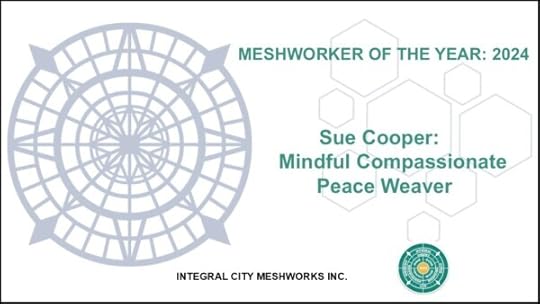
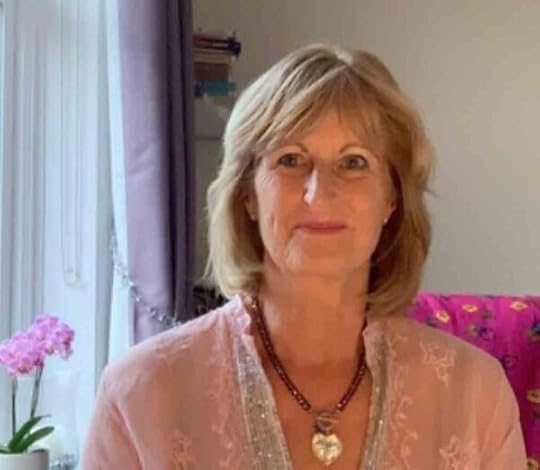
Sue Cooper is a graduate of Integral City Meshwork’s Beyond Resilient Course and has been taking her learnings to her home cities – Nottingham and Nottinghamshire – especially through her influence as a Living Cities Earth Co-Founder.
Sue calls her work Living Cities: Notts – applying the Integral City framework of the four voices to call the whole Living Cities: Notts System to learn from itself.
Sue started her career as a Nurse and then amplified that profession with Ayurvedic practices (learning with Deepak Chopra). The words that set Sue alight as a new trainee nurse in the early 1970’s came from Florence Nightingale (1820-1910):
‘The role of the nurse is to put the patient in the best possible condition so that nature can act and healing occur.’
Sue explains:
When we care for the whole person – physical, mental, emotional, spiritual in relationship with others and the environment we create a compassionate relationship and promote comfort and care. Florence Nightingale believed that incorporating five essential elements, pure air, clean water, efficient drainage, cleanliness and light/direct sunlight, these elements accelerate the body’s innate healing abilities. Whilst we now have drugs, surgeries and incredible diagnostic technologies, we must remember our interconnectivity in the World and the fundamentals of actively caring for ourself, each other, our community and our home, Mother Earth not only when we become unwell but as an act of deep responsibility to maintain vitality and active health.
For over 10 years I travelled and explored many natural healing modalities from indigenous cultures around the world, their applications to modern day Self Care and the fusion with scientific research from Health Care. The essence of these ancient cultures and traditions had been forgotten through all our advances in the scientific model of health. We had lost the art of connection to our deeper, truer, beautiful Self where we learn to feel again, to be in partnerships with family and a sense of belonging and empowerment of community and our natural environment. Alone it can be hard, together it can be fun, we simply need to open our minds and hearts to connecting and finding each other.
During my years of caring as a clinical nurse, researcher, manager, health educator and business owner, I found that the energy we brought into the relationships made possible solutions that were based on mutual respect and agency.
Compassionate community building through activating and amplifying holistic health modalities as we strengthen local ties, is what I’m called to do.
When I consider Interior Truth, I realize there is only so far you can go on your own.
I know from my own experience of overwhelm, that I need the courage to ask for help. When we are seeking help, how do we find each other? In 2017 we created a mass meditation event and holistic well-being family day in our home city of Nottingham, England. Thousands came to explore the energy and presence of all contributors sharing their skills, passion and holistic therapies. This day transformed the way we see and act with each other from competition to collaboration and still exists to this day. From this day, MOMM was born – Moments Of Mass Mindfulness .
The following year, May 2018, 3 cities, Bristol, Leeds and Nottingham linked together to be in nature and to be fully present in the parks and centre at the same time, with the intention of peace in our hearts, homes, cities and planet.
In 2019 The HeartMath Institute requested a collaboration and we expanded our small idea from 1 city to 3 cities to hundreds of cities and countries as recorded in the figures below.
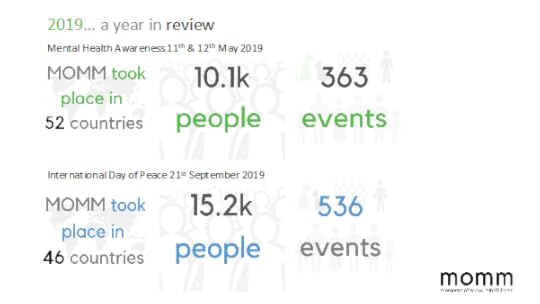 For a beautiful view on how these days and initiatives evolved and co-created a harmonic resonance of well-being in the world watch this video.
For a beautiful view on how these days and initiatives evolved and co-created a harmonic resonance of well-being in the world watch this video.MOMM is now a dynamic, volunteer-led initiative rooted in care and compassion, connection and collaboration and experienced through co-creating compassionate community gatherings, engaging in citizen, business, charity and governance action to raise awareness of mindfulness practices for conscious health and vibrant well-being.
At the same time, Sue’s Social Enterprise, Self Care World was nurturing the same intentions, offering, renewing and regenerating, fresh and vibrant perspectives of care. Like the Master/Gaia Code of Care, Sue has found that as we practice caring for our self we naturally radiate a more peaceful and heartful way to others we enliven both our communities and our world.
Sue holds many voluntary roles in her local community. She is a Non-Executive Director of Positively Empowered Kids CIC, which inspires and listens to the voice of the children whilst holding an annual festival of well-being in the Nottinghamshire community. Their fourth festival in 2024 drew in over 4,000 people to enjoy all the superhero activities to experience the diverse offerings in support of young people and their families.
Sue is an honorary Ambassador to Nottingham Mindfulness Group and encourages people to connect and join in events like the weekly on-line mindfulness offering of Sean Glossop for settling the mind whilst sharing knowledge and wisdom from an array of trusted sources.
She also supports Nottinghamshire Hospice offers care at home in the community to people at the end of their life and their families. They are the largest provider of direct community care in the country and it is a deep privilege to be an ambassador for their service, their wonderful staff and volunteers and their very ethos – ‘Compassion lives here.’ Palliative care has never lost its roots in holistic care, treating the patient, family, home and community as one interactive whole.
In 2020 Sue was invited to run daily global meditations by Co-creating Europe, Caravan of Unity for 21 days leading up to World Peace Day. She remembers:
As this was during the period where we were all locked in and fairly new to the amazing opportunities that Zoom would bring to the collective, I invited meditation teachers and guides from around the world to offer a daily meditation practice and a much-appreciated time of convivial conversation. Dr Marilyn Hamilton was on the organising team and when we were out and about in the world again, Marilyn came to stay and visit the many projects and inspirational people in our local community. When I was invited to be a co-founder of Living Cities Earth, I recognised the vision deeply reflected by own passions and those of our local community.
This vision is vast and achievable as we activate in our local communities the way of being to human well together, for aliveness with love. From the Earth vision, a few of us have volunteered to distilled many of the concepts and initiated Living Cities–Notts, creating a blueprint for collective action in one of our regions in the County of Nottinghamshire. We are being welcomed in, building a network of trust through the 4 voices of the city and developing a real willingness to find a path together towards a compassionate whole person, whole system and natural way of living and working – flexing and flowing – together.
Amplifying MOMM, at the beginning of each year, Sue has become a co-creator of the 40 days of Feast for the Soul. She was invited by Sarah McLean in 2021 to become co-director of Feast for the Soul, weaving together the 40 day worldwide spiritual practice immersive. Feast for the Soul has been running for 17 years from 15th January – 23rd February each year. The free resource library is vast, featuring meditations, mindfulness practices, contemplation practices, prayers and poems from worldwide teachers and guides. From a perspective of life-long learning and practices leading to coherence, Sue curates these resources as an opportunity to experience peacefulness and calm therefore self-regulating the mind-body connection, enhancing energy and vitality and a sense of being fully present and engaged.
A highlight of 2024 for Sue was an invitation by Charter for Compassion to attend the 4 day, XIX Nobel Peace Laureates Summit in Monterrey, Mexico under the theme ‘Peace and Progress: A Path to Collective Prosperity. The summit was a catalyst for innovative solutions, fostering a renewed spirit of collaboration in the pursuit of a more peaceful and equitable future. It was a time of activating and amplifying the need for us all to step up and join together in this peaceful and passionate endeavour.
On a personal note, Sue was honoured to represent the Charter for Compassion as Ambassador from the U.K.. She delivered the Karen Armstrong Humanitarian Award to an inspirational group of activists – Seeds of Peace – honouring their dedication to empowering young leaders who will carry the torch of peace into the future, lighting the way for generations to come.
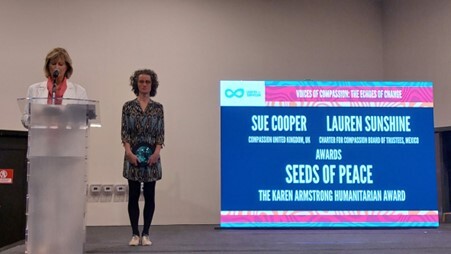 AWARD
AWARDA quintessential Meshworker, Sue catalyses islands of coherence wherever her callings take her, weaving systems into higher orders of consciousness – as captured in this inspiration from Nobel Laureate, Ilya Prigogine:
“When a complex system is far from equilibrium, small islands of coherence in a sea of chaos have the capacity to shift the entire system to a higher order.”
We are proud to award theIntegral City Meshworker of the Year 2024 to Sue Cooper.===
Definition of Meshworker
A Meshworker of the Year demonstrates the meshworking intelligence as defined on the website . Meshworking intelligence creates a “meshwork” by weaving together the best of two operating systems — one that self-organizes, and one that replicates hierarchical structures. The resulting meshwork creates and aligns complex responsive structures and systems that flex and flow.
Candidates for the Meshworkers of the Year Award invest dollars, time, effort and expertise at a level of complexity that serves a whole city or cities. Here are our previous winners:
2023: Gail Taylor2022: Dr. Jude Currivan2021: Jim Garrison2020: Ellen van Dongen2019: Anne-Marie Voorhoeve2018: Diana Claire Douglas2017: Hub Co-Evolucio, Reus, Catalonia, Spain2016: Morel Fourman, Gaiasoft,Africa 2015: Imagine Durant, USA2014: Team ARGO, Russia2013: Populus, CanadaMeet Sue Cooper, Integral City Meshworker 2024.“The goal ...
.
Sue Cooper: Nurse. Ayurvedic Lifestyle Educator. Mindfulness and Meditation Teacher. She is continually amazed at all that this beautiful life has to offer. She receives guidance with Grace and serves community empowerment with Care, Compassion, Love and Aliveness.

Sue Cooper is a graduate of Integral City Meshwork’s Beyond Resilient Course and has been taking her learnings to her home cities – Nottingham and Nottinghamshire – especially through her influence as a Living Cities Earth Co-Founder.
Sue calls her work LCE: Notts – applying the Integral City framework of the four voices to call the whole LCE: Notts System to learn from itself.
Sue started her career as a Nurse and then amplified that profession with Ayurvedic practices (learning with Deepak Chopra). The words that set Sue alight as a new trainee nurse in the early 1970’s came from Florence Nightingale (1820-1910)
‘The role of the nurse is to put the patient in the best possible condition so that nature can act and healing occur.’
Sue explains:
When we care for the whole person – physical, mental, emotional, spiritual in relationship with others and the environment we create a compassionate relationship and promote comfort and care. Florence Nightingale believed that incorporating five essential elements, pure air, clean water, efficient drainage, cleanliness and light/direct sunlight, these elements accelerate the body’s innate healing abilities. Whilst we now have drugs, surgeries and incredible diagnostic technologies, we must remember our interconnectivity in the World and the fundamentals of actively caring for ourself, each other, our community and our home, Mother Earth not only when we become unwell but as an act of deep responsibility to maintain vitality and active health.
For over 10 years I travelled and explored many natural healing modalities from indigenous cultures around the world, their applications to modern day Self Care and the fusion with scientific research from Health Care. The essence of these ancient cultures and traditions had been forgotten through all our advances in the scientific model of health. We had lost the art of connection to our deeper, truer, beautiful Self where we learn to feel again, to be in partnerships with family and a sense of belonging and empowerment of community and our natural environment. Alone it can be hard, together it can be fun, we simply need to open our minds and hearts to connecting and finding each other.
During my years of caring as a clinical nurse, researcher, manager, health educator and business owner, I found that the energy we brought into the relationships made possible solutions that were based on mutual respect and agency.
Compassionate community building through activating and amplifying holistic health modalities as we strengthen local ties, is what I’m called to do.
When I consider Interior Truth, I realize there is only so far you can go on your own.
I know from my own experience of overwhelm, that I need the courage to ask for help. When we are seeking help, how do we find each other? In 2017 we created a mass meditation event and holistic well-being family day in our home city of Nottingham, England. Thousands came to explore the energy and presence of all contributors sharing their skills, passion and holistic therapies. This day transformed the way we see and act with each other from competition to collaboration and still exists to this day. From this day, MOMM was born – Moments Of Mass Mindfulness www.mommworld.org .
The following year, May 2018, 3 cities, Bristol, Leeds and Nottingham linked together to be in nature and to be fully present in the parks and centre at the same time, with the intention of peace in our hearts, homes, cities and planet.
In 2019 The HeartMath Institute www.heartmath.org requested a collaboration and we expanded our small idea from 1 city to 3 cities to hundreds of cities and countries as recorded in the figures below.
 For a beautiful view on how these days and initiatives evolved and co-created a harmonic resonance of well-being in the world watch this video.
For a beautiful view on how these days and initiatives evolved and co-created a harmonic resonance of well-being in the world watch this video.MOMM is now a dynamic, volunteer-led initiative rooted in care and compassion, connection and collaboration and experienced through co-creating compassionate community gatherings, engaging in citizen, business, charity and governance action to raise awareness of mindfulness practices for conscious health and vibrant well-being.
At the same time, Sue’s Social Enterprise, Self Care World www.selfcareworld.org was nurturing the same intentions, offering, renewing and regenerating, fresh and vibrant perspectives of care. Like the Master/Gaia Code of Care, Sue has found that as we practice caring for our self we naturally radiate a more peaceful and heartful way to others we enliven both our communities and our world.
Sue holds many voluntary roles in her local community. She is a Non-Executive Director of Positively Empowered Kids CIC, www.positivelyempoweredkids.co.uk which inspires and listens to the voice of the children whilst holding an annual festival of well-being in the Nottinghamshire community. Their fourth festival in 2024 drew in over 4,000 people to enjoy all the superhero activities to experience the diverse offerings in support of young people and their families.
Sue is an honorary Ambassador to Nottingham Mindfulness Group www.nottinghammindfulnessgroup.co.uk and encourages people to connect and join in events like the weekly on-line mindfulness offering of Sean Glossop for settling the mind whilst sharing knowledge and wisdom from an array of trusted sources.
She also supports Nottinghamshire Hospice www.nottshospice.org offers care at home in the community to people at the end of their life and their families. They are the largest provider of direct community care in the country and it is a deep privilege to be an ambassador for their service, their wonderful staff and volunteers and their very ethos – ‘Compassion lives here.’ Palliative care has never lost its roots in holistic care, treating the patient, family, home and community as one interactive whole.
In 2020 Sue was invited to run daily global meditations by Co-creating Europe, Caravan of Unity for 21 days leading up to World Peace Day. She remembers:
As this was during the period where we were all locked in and fairly new to the amazing opportunities that Zoom would bring to the collective, I invited meditation teachers and guides from around the world to offer a daily meditation practice and a much-appreciated time of convivial conversation. Dr Marilyn Hamilton was on the organising team and when we were out and about in the world again, Marilyn came to stay and visit the many projects and inspirational people in our local community. When I was invited to be a co-founder of Living Cities Earth, www.livingcities.earth I recognised the vision deeply reflected by own passions and those of our local community.
This vision is vast and achievable as we activate in our local communities the way of being to human well together, for aliveness with love. From the Earth vision, a few of us have volunteered to distilled many of the concepts and initiated Living Cities–Notts, creating a blueprint for collective action in one of our regions in the County of Nottinghamshire. We are being welcomed in, building a network of trust through the 4 voices of the city and developing a real willingness to find a path together towards a compassionate whole person, whole system and natural way of living and working – flexing and flowing – together.
Amplifying MOMM, at the beginning of each year, Sue has become leader of the 40 days of Feast for the Soul. She was invited by Sarah McLean in 2021 to become co-director of Feast for the Soul, weaving together the 40 day worldwide spiritual practice immersive. Feast for the Soul has been running for 17 years from 15th January – 23rd February each year. The free resource library is vast, featuring meditations, mindfulness practices, contemplation practices, prayers and poems from worldwide teachers and guides. From a perspective of life-long learning and practices leading to coherence, Sue curates these resources as an opportunity to experience peacefulness and calm therefore self-regulating the mind-body connection, enhancing energy and vitality and a sense of being fully present and engaged.
A highlight of 2024 for Sue was an invitation by Charter for Compassion to attend the 4 day, XIX Nobel Peace Laureates Summit in Monterrey, Mexico under the theme ‘Peace and Progress: A Path to Collective Prosperity. The summit was a catalyst for innovative solutions, fostering a renewed spirit of collaboration in the pursuit of a more peaceful and equitable future. It was a time of activating and amplifying the need for us all to step up and join together in this peaceful and passionate endeavour.
On a personal note, Sue was honoured to represent the Charter for Compassion as Ambassador from the U.K.. She delivered the Karen Armstrong Humanitarian Award to an inspirational group of activists – Seeds of Peace – honouring their dedication to empowering young leaders who will carry the torch of peace into the future, lighting the way for generations to come.

A quintessential Meshworker, Sue catalyses islands of coherence wherever her callings take her, weaving systems into higher orders of consciousness – as captured in this inspiration from Nobel Laureate, Ilya Prigogine:
“When a complex system is far from equilibrium, small islands of coherence in a sea of chaos have the capacity to shift the entire system to a higher order.”
We are proud to bestow theIntegral City Meshworker of the Year 2024 Award to Sue Cooper.~~~
===
Definition of Meshworker
A Meshworker of the Year demonstrates the meshworking intelligence as defined on the website . Meshworking intelligence creates a “meshwork” by weaving together the best of two operating systems — one that self-organizes, and one that replicates hierarchical structures. The resulting meshwork creates and aligns complex responsive structures and systems that flex and flow.
Candidates for the Meshworkers of the Year Award invest dollars, time, effort and expertise at a level of complexity that serves a whole city or cities. Here are our previous winners:
2023: Gail Taylor2022: Dr. Jude Currivan2021: Jim Garrison2020: Ellen van Dongen2019: Anne-Marie Voorhoeve2018: Diana Claire Douglas2017: Hub Co-Evolucio, Reus, Catalonia, Spain2016: Morel Fourman, Gaiasoft,Africa 2015: Imagine Durant, USA2014: Team ARGO, Russia2013: Populus, CanadaNovember 3, 2024
I AM CARE : AMERICA
On October 30, 2020 – on the eve of the 2020 American elections, Integral City published this prayer from Sue Cooper – who, along with Integral City’s Marilyn Hamilton is a Co-Founder of Living Cities. Earth.
It seems more appropriate than ever to re-publish this prayer today – just on the eve of the 2024 American elections.
As much sacred energy is holding America at this time of opportunities, challenges and changes, we are grateful to Sue Cooper who has shared this Global Prayer with Integral City. Sue is the Founder of Moments of Mass Mindfulness (MOMM). This poem seems so aligned with our Gaia/ Master Code of Care that we are inspired to convey Sue’s request that you share it with others and hold America in CARE.
 AMERICA: I AM CAREI am care: America, “We the people”, may I truly know itMay I feel the I AM vibration of my soul’s creationI AM CAREThrough the life force and rhythm of my heart beat with natureI AM CAREMay I remember that care is at the heart of the founding of AmericaI AM CAREBuilt on the values of freedom, of liberty, of equality and unityI AM CARERadiating peace, deep inner peace and harmony into the worldI AM CARECo-creating compassionate and caring communitiesI AM CARELoving, sharing, caringMay I AM be the mantraCARE my prayerAMERICA
Sue Cooper writes further ” I am a creation of my hearts sensation.” She reads the prayer on YouTube here:
https://youtu.be/JffqyZvFwJ0
Sue Tells the Story of the prayer
AMERICA: I AM CAREI am care: America, “We the people”, may I truly know itMay I feel the I AM vibration of my soul’s creationI AM CAREThrough the life force and rhythm of my heart beat with natureI AM CAREMay I remember that care is at the heart of the founding of AmericaI AM CAREBuilt on the values of freedom, of liberty, of equality and unityI AM CARERadiating peace, deep inner peace and harmony into the worldI AM CARECo-creating compassionate and caring communitiesI AM CARELoving, sharing, caringMay I AM be the mantraCARE my prayerAMERICA
Sue Cooper writes further ” I am a creation of my hearts sensation.” She reads the prayer on YouTube here:
https://youtu.be/JffqyZvFwJ0
Sue Tells the Story of the prayerI had been in America for two weeks in March 2020 and the local authorities were increasingly reacting to the pandemic and shutting down areas. I was in San Francisco and the conference I was attending closed a day early, leaving us time to explore. What we saw about homelessness was quite shocking on the few streets from the main parade of shops, a different world. As we travelled South towards Los Angeles, again we saw areas of inequality where people were suffering through not being able to buy their medication and not enough money to buy real food. It struck me forcibly that in our current timeframe, there should be more than enough to go round, if only each and every one of us cared a little more and emulated the values of the founding of America.
I became aware that America was becoming lost, we all refer to it as the U.S. Where has America disappeared to? I meditated on this and after meditation became aware that by centring attention on the 7 letters of America, when rearranged made three words – I am care – then the words and vibrational frequency of deep care and clarity revealed themselves through journaling. The prayer was born.
To connect with the prayer and for greatest effect, firstly become still for a few moments, then read silently to self. Then, through your voice speak and share it out loud to offer the vibration into the world.
The intention is that whenever the word America is used, we know that the positive and meaningful truth we are seeking to manifest through this vibration is I AM CARE.
Thank you for caring and sharing this freely and widely.
Love Sue xxx
Sue Cooper, Founder, MOMM Moments of Mass Mindfulness Nottingham, England www.mommworld.org
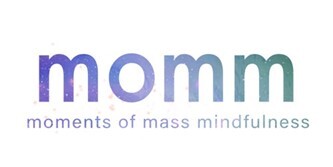
September 19, 2024
September 2024 Equinotes: Placecaring & Placemaking Capacities
 Equinotes are published periodically drawing on the Archives of Integral City’s Reflective Organ Newsletter, Blogs, Books and Website. The perspectives of Equinotes weave across: Planet, People, Place and Power. The theme of this issue is Placecaring and Placemaking.
September 2024 Equinotes are drawn from these publications:
Equinotes are published periodically drawing on the Archives of Integral City’s Reflective Organ Newsletter, Blogs, Books and Website. The perspectives of Equinotes weave across: Planet, People, Place and Power. The theme of this issue is Placecaring and Placemaking.
September 2024 Equinotes are drawn from these publications:
Placecaring & Placemaking: Hamilton, M. 2018. Integral City 3.7: Reframing Complex Challenges for Gaia’s Human Hives. Minneapolis, MN: Amaranth Press,LLC p.296
Science & Spirit of Commoning Well in Community by Marilyn Hamilton|September 20th, 2022|Building – Structures, C. Collective Intelligences, Householder Dharma, Integral Maps, Placecaring, Placemaking, Storytelling – Cultures
Citizens: Discover the Complexity of Community, Integral City Meshwork Website
How Can We Influence City Development in Creative Economy?Interview of Marilyn Hamilton by Lev Gordon, Founder of Living Cities Russia, CoFounder Living Cities Earth. December 11th, 2020|A. Contexting Intelligences, B. Individual Intelligences, C. Collective Intelligences, Capacity Building, Caring, Caring, Contexting, E. Evolutionary Intelligences, Meshworking, Placecaring, Placemaking
Scroll to end of Equinotes to access Free Resources, MetaBlogs 2013-2024 Plus Bonus Video: Radical Guide to RealityIn the modern era, cities have tended to focus primarily on placemaking, either ignoring or denying the importance of placecaring. But, it turns out that cities who develop their caring capacity are cities who develop their carrying capacity for economies, systems and infrastructures. Thus, we have learned that caring and carrying capacity need to be in balance.
When we only build value for one stakeholder or one quadrant, the city grows in an unbalanced way. While developers and business naturally focus on placemaking capacities (Right Quadrants), and citizens and civil society naturally focus on placecaring capacities (Left Quadrants), in order to flourish, cities need to bring placecaring and placemaking into an organic flow and balance.
Hamilton, M. 2018. Integral City 3.7: Reframing Complex Challenges for Gaia’s Human Hives. Minneapolis, MN: Amaranth Press,LLC p.296
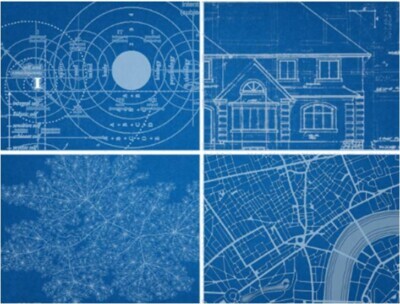 Science & Spirit of Commoning Well in CommunityLife and circumstances in our dynamic evolving Ecovillages and Urban Habitats, are giving us the opportunity not only to define our Commons, and who might steward them but also how might we do that in community, so we honour both the wisdom of Spirit and intelligences of Nature? Elinor Ostrom’s principles for Commoning might serve us well for both Placecaring and Placemaking.“The life and spirit of the Commons is already within us. We ARE the Commons, for we are part of this planet, part of Gaia. It’s now a matter of acknowledging that this is so and acting accordingly.” (Spangler, David)
Science & Spirit of Commoning Well in CommunityLife and circumstances in our dynamic evolving Ecovillages and Urban Habitats, are giving us the opportunity not only to define our Commons, and who might steward them but also how might we do that in community, so we honour both the wisdom of Spirit and intelligences of Nature? Elinor Ostrom’s principles for Commoning might serve us well for both Placecaring and Placemaking.“The life and spirit of the Commons is already within us. We ARE the Commons, for we are part of this planet, part of Gaia. It’s now a matter of acknowledging that this is so and acting accordingly.” (Spangler, David)From this beautiful spirit of the Commons, I would like to share some insights from the science of commoning – the practices of co-holding Commons that can be useful for Ecovillages (like Findhorn Ecovillage where I live) and Urban Habitats everywhere that are seeking guidance for Commoning well in Community.
Elinor Ostrom, a Nobel-prize winning economist was curious if there were characteristics in communities that were successful in their commoning practices. Her research determined that successful Commoning shared eight practices.Click here to read the full Thought Piece.
 Citizens: Discover the Complexity of CommunityHow Do I Find Community in Complexity in my City?Where do I find community in the city? In my neighborhoods. On the street. At my workplace. At my place of worship. In my cultural centres. With my communities of practice.In thinking about the community, I find it useful to examine community systems as complex adaptive systems that are multi-relational, multi-scalable and multi-dynamic. In other words, it seems that community and complexity co-emerge by virtue of my life’s interconnections and interrelationships.
Citizens: Discover the Complexity of CommunityHow Do I Find Community in Complexity in my City?Where do I find community in the city? In my neighborhoods. On the street. At my workplace. At my place of worship. In my cultural centres. With my communities of practice.In thinking about the community, I find it useful to examine community systems as complex adaptive systems that are multi-relational, multi-scalable and multi-dynamic. In other words, it seems that community and complexity co-emerge by virtue of my life’s interconnections and interrelationships.Why is Community Important?
Community is vital to my personal health and welfare. Without connecting to community, I lack the context to understand my individual capacity and how I make meaning from life’s experience. In other words I have no terms of reference. But within a community context, I gain the support to learn values, knowledge, behaviors and life skills. In fact, research shows, that people who are active in community are healthier, more motivated and live longer. That has to be an outstanding benefit of a healthy city.
If I want to change in any way, my community will support or challenge my intentions. If I want to change in a sustainable way, my community can help me to change my story and the way I tell that story internally and externally to make meaning of the change. This is clearly work (and play) that involves a constant discovery of the complexity of community.
Some of the ways that I can do that are explained on the website.Click here to read the full section on Integral City Meshworks Website.
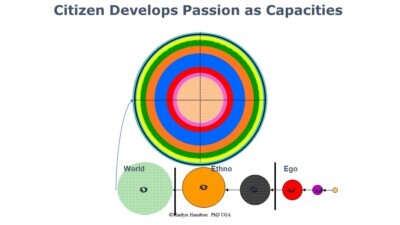 How Can We Influence City Development in Creative Economy?I would start with considering that as citizens we should express gratitude for our cities. They are the most complex systems yet created by humans.What should you be grateful for? That you live in a place where it is possible to express what you are passionate about. What you love to be, do, share and co-create is your greatest gift to the city. Knowing what you love about yourself can also help you find what you love about your city.Find that “corner” of the city that you love and invite others to share their beloved places. Notice what brings life and energy to those places when you are together. It is inevitably your passion – and that leads you to discover purpose and priorities.
How Can We Influence City Development in Creative Economy?I would start with considering that as citizens we should express gratitude for our cities. They are the most complex systems yet created by humans.What should you be grateful for? That you live in a place where it is possible to express what you are passionate about. What you love to be, do, share and co-create is your greatest gift to the city. Knowing what you love about yourself can also help you find what you love about your city.Find that “corner” of the city that you love and invite others to share their beloved places. Notice what brings life and energy to those places when you are together. It is inevitably your passion – and that leads you to discover purpose and priorities.As a Citizen you are part of Gaia’s City Design pattern. The Citizen is one of the 4 Voices of the Human Hive. The other 3 Voices are Civic Managers (government), Business Innovators, 3rd Sector (NGO/Academia). (I have learned this from the honeybee hive who has these same 4 roles.)
Until recently most of human evolution has practised competition as the way to move forward – that is because humans are a very young species – and Competition is typical behavior for a young species. However, as evolution biologist Elisabet Sahtouris points out, the next stage of development for a maturing species is Cooperation and Collaboration.
So, to cooperate is to evolve – and specially to cooperate with the 4 Voices of the Human Hive means that you are cooperating with the whole system. By the same token, those other 3 Voices must also cooperate with citizens. It is by sitting around the same table as 4 Voices that we can make the wisest cooperative decisions.
For city development this creates the conditions for optimum health, wellbeing and justice.
Click here to read the full interview of Marilyn Hamilton by Lev Gordon.
Explore Integral City Archive of Newsletters, Blogs, MetaBlogs & Bonus VideoBonus Video: Radical Guide to Reality from Cosmologist Jude CurrivanReflective Organ Newsletter June Solstice 2024: Ecovillage, City, 4th VoiceMarch 2024 Equinotes: Surviving Shadow, Trauma, Loss
Reflective Organ Newsletter December Solstice 2023: Gaia Breathes, Learns, Fruits
September 2023 Equinotes: Amplified Intelligences, Wisdom, Principles
March 2023 Equi-Notes: Roots of City Peace in Joy, Happiness and Care
.fusion-fullwidth.fusion-builder-row-1 { overflow:visible; }Listening to Local Place Plan Voices – Economy, Education, Enterprise – 5/5
This is a series of Infographics that share the journey of the 4 Voices of the Park Ecovillage Findhorn, Scotland. The stories follow them as they explore integral perspectives while they collaborate on preparing a Local Place Plan to deliver to Moray municipality. The articles were originally published in the Rainbow Bridge – the Park Ecovillage Findhorn Community Magazine between June and September 2024.
This first one focuses on Economy, Education, Enterprise.
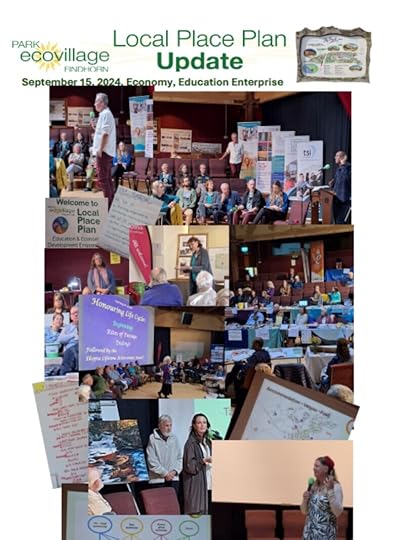

Listening to Local Place Plan Voices – Environment – 4/5
This is a series of Infographics that share the journey of the 4 Voices of the Park Ecovillage Findhorn, Scotland. The stories follow them as they explore integral perspectives while they collaborate on preparing a Local Place Plan to deliver to Moray municipality. The articles were originally published in the Rainbow Bridge – the Park Ecovillage Findhorn Community Magazine between June and September 2024.
This fourth one focuses on Environment.
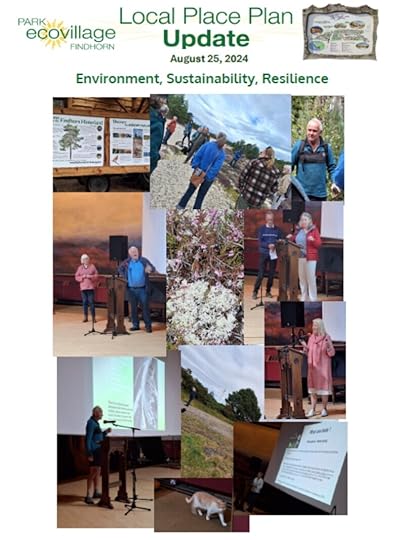
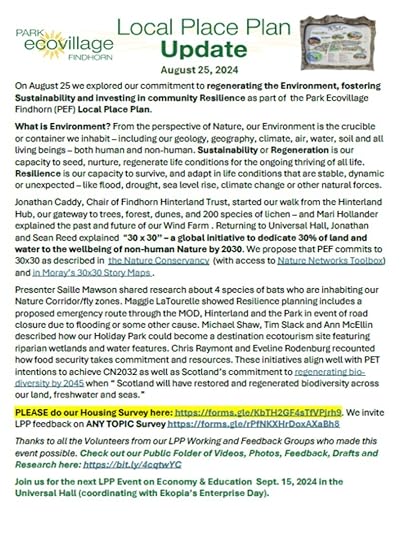
September 18, 2024
Listening to Local Place Plan Voices – Housing2 -3/5
This is a series of Infographics that share the journey of the 4 Voices of the Park Ecovillage Findhorn, Scotland. The stories follow them as they explore integral perspectives while they collaborate on preparing a Local Place Plan to deliver to Moray municipality. The articles were originally published in the Rainbow Bridge – the Park Ecovillage Findhorn Community Magazine between June and September 2024.
This third one focuses on Housing 2.
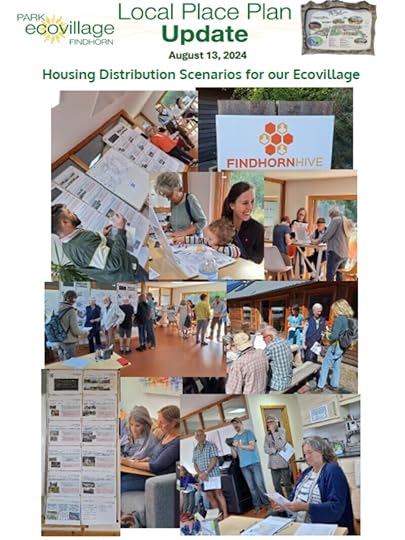
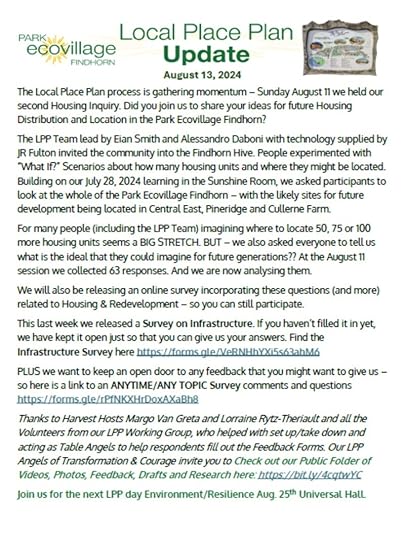
Marilyn Hamilton's Blog
- Marilyn Hamilton's profile
- 3 followers



